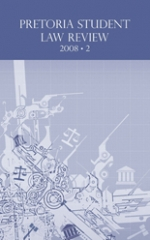Pretoria Student Law Review 2008 - 2

Pretoria Student Law Review 2008-2
Edited by Neil Coetzer, Ian Learmonth, Francisca Pretorius, Avani Singh and Johann Spies
Assistant Editors: Bronwynne Botha and Heinrich Louw
2008
ISSN: 1998-0280
Pages: 109
Print version: Available
Electronic version: Free PDF available
| File Size: | 690.44 KB |
| File Type: | application/pdf |
| Hits: | 13114 Hits |